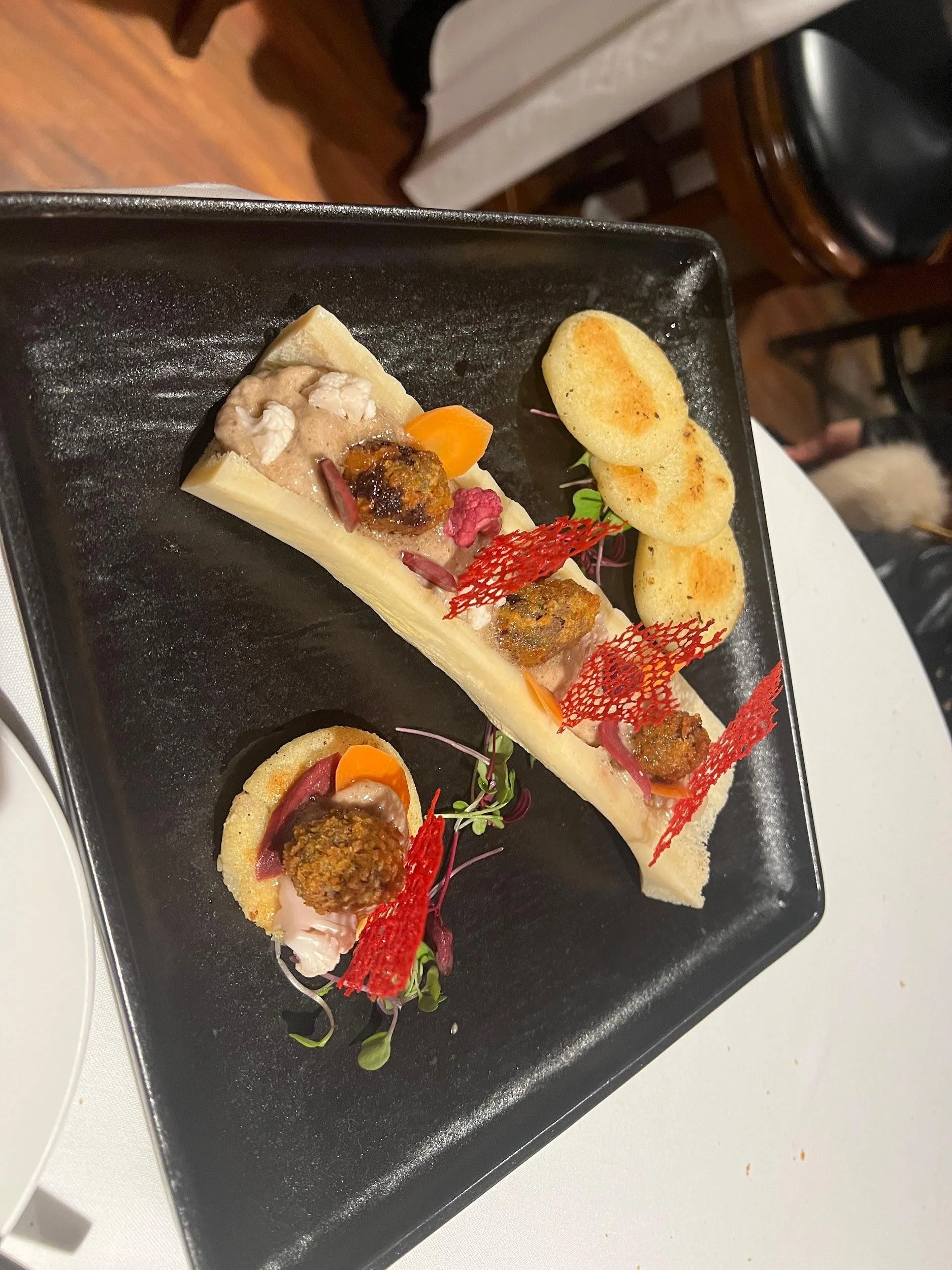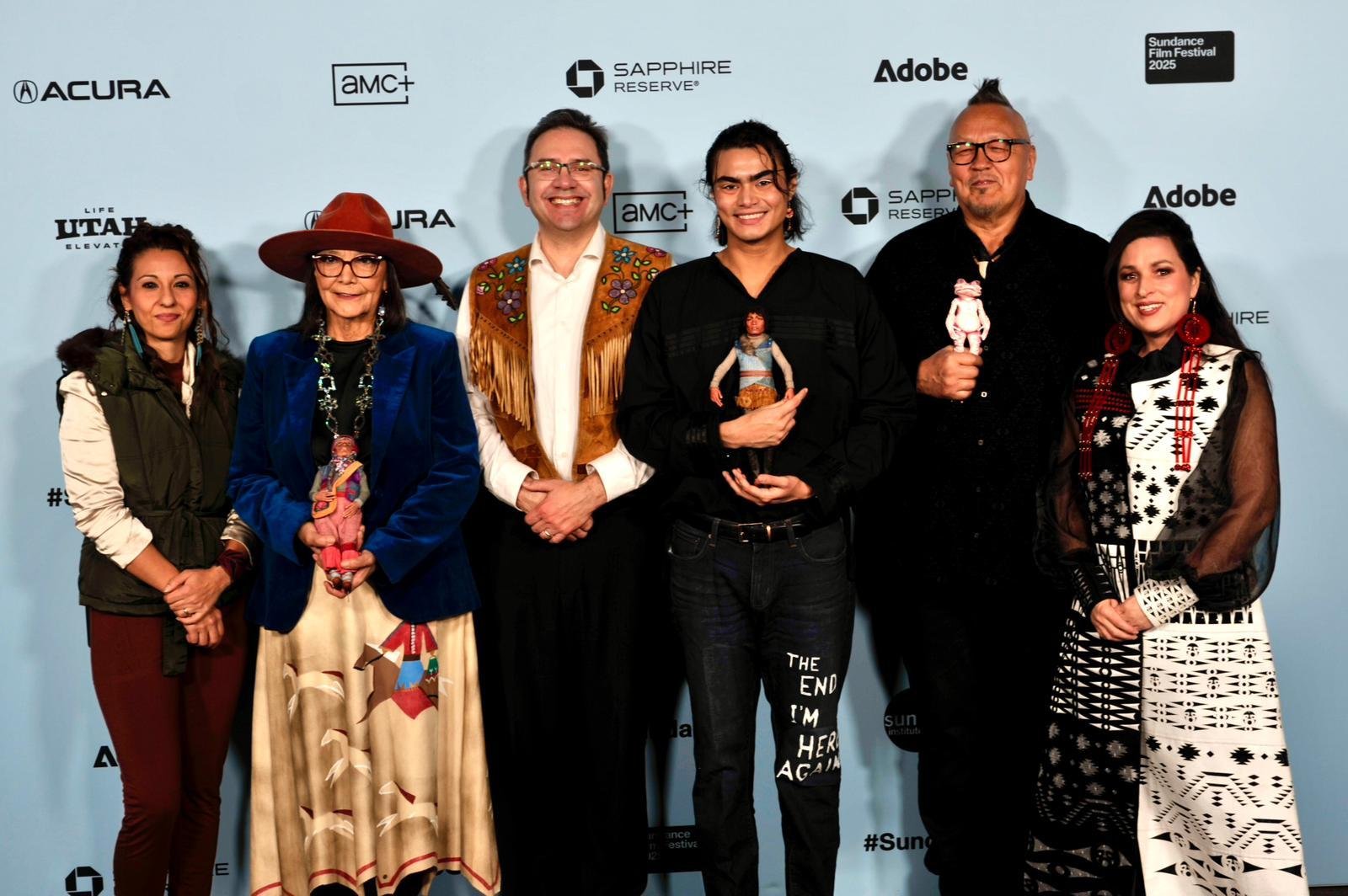What are the odds?
In January of this year, I attended the widely beloved Sundance Film Festival on the Tlicho Government and Spotted Fawn Productions’ collective dime. In the weeks leading up to Sundance, I had a number of tense conversations with people involved in the production. The short of it is, I had come onto the stop-motion project Inkwo For When The Starving Return as the face and body of its protagonist, Dove, back in 2018. Due to a nuanced “perfect storm” of personal and political missteps, I remained the body of Dove, but lost my chance to be the voice. For three of those eight years, I was incommunicado with Spotted Fawn Productions, as I’d finally settled on a name for myself and abandoned the more active, well-known email I’d used for all five years I’d beaten my moth-body raw against the flickering lightbulb of the film industry.
It was pure luck I checked the old email when I did, finding months’ worth of unanswered missives from Amanda and co. asking me if I wanted to come to the premiere of a short film I’d all but lost faith in. This was in August of 2024, just before the film premiered at Toronto International Film Festival, and as I frantically tried to move our communications to my new name, my new email, a whole slew of complex, bitter emotions swarmed my flesh. When my polymer puppet body walked the red carpet at TIFF, without me, those emotions hardened into a sense of entitlement I’m sure we’re all familiar with. The ancient berserker battle cry of “It should have been me.”
Dove the Puppet and Frog by Standing Figure, walking the red carpet at Toronto International Film Festival
I name these facts because there is a version of events, a parallel universe, if you will, wherein I broadcasted my every grievance to Instagram, TikTok, Bluesky, even Tumblr, garnering the fractious, splintered, scattershot support of hundreds of faceless strangers who (destructively, parasocially) could see themselves in my “struggle,” in the power imbalances at play during the lead up to and culmination of my time as Dove.
Siloed in the low, brushed grey foothills of the Utah canyons, my friend and favorite cartoonist Maya McKibbin and I stared at a bisected femur filled with bone marrow pudding on our shared dinner plate. Outside, gas fires burned in perpetuity for the benefit of the wealthy patrons of our resort, a temporary demographic we, by some accident, now belonged to. On TV, the wax figure who owned the Kansas City Chiefs stood in the center of his football field like Joaquin Phoenix in Gladiator, brandishing an accolade the miraculous young blood of Kelce and Mahomes acquired for him. As his long, grey teeth darted out between his thin lips with serpentine ecstasy, bone marrow slipped out of its honeycomb boat and I mopped it up with a rich, yellow bread.
The bone marrow plate
We were being waited on hand and foot by Larry, a former military brat who showed an incomplete set of crooked teeth whenever we coaxed a smile from him. Good humor shone out of his conspiratorial eyes the moment he realized we weren’t, despite our presence in the Westgate, his usual clientele. He lingered at our table longer than the others, regaling us with gossip from the other hotels—did you know the competition doesn’t drug test? We do, though. We’re serious about it. Did you know there’s no smoking anywhere on the premises? No, not even cigarettes, not vapes. Yes, they check. Have you seen Wizards? I saw it the first time, well. We were on shrooms and my friend asked me, have you seen Wizards? And I’m almost certain I’ve watched it about thirty-two times since—
The bone belonged to a buffalo. It was the starter. We’d ordered six bones of lamb, which Larry told us had been raised in the strawberry fields, running along the creeks, through pine trees and moss. I could see them in my mind’s eye—six white lambs, their ears tilting back and forth, perhaps aware, in some obscure way, that they had been born for slaughter. There they were, playing in the snow, pulling lichen from stones and blinking slowly.
Larry continued to explain that the farm was owned by a family who’d been in Utah for almost two hundred years. I suddenly reconsidered our decision to come to the steakhouse. It’d been out of convenience, more than anything. We were so far from the rest of our crew, from Park City itself, with no car and no idea what was open. We’d been so blindsided by the mere existence of the Westgate—that yes, this was where we were staying, yes, we got all the perks—that once we got to our room, we were torn between the burger bar and The Edge, an award-winning full service steakhouse on the fourth floor.
I mean, we said to each other. How many times do we get this opportunity? How many times can we stay in a place like this? I mean, I mean, I mean—
Maya, a whole head shorter than me, squinted up at me, their vulpine face pinched like a cowboy before a shootout.
I mean, I said again, and we changed out of our plane clothes into matching metallic outfits. As we walked from one lodge to another, I wondered aloud at just how many things were inside this warm sprawl, sequestered and connected by yellowing tunnels. A flash of receding bleach blonde hair, wrinkled pink flesh, and a shiny black puffer jacket called down to us, I know, it’s just so much easier.
So the bone marrow. So Larry.
Maya and I eyed each other over the tall, round table. I caught the gaze of the elderly couple next to us, the man with his bloodhound eyes in pools of papery white flesh, face impassive. I’d bricked my iPhone the day before my flight to Salt Lake City with an app called “Dumbphone,” which seeks to replace your home screen with a bland stack of text: Call, Messages, Camera, Music. Below, in smaller text, is the ambiguously titled “apps,” which leads you to your essentials—maps, email, weather.
It wasn’t perfect, but it was enough of a deterrent that I got all my news about the Trumpocalypse through messages from friends who work for and around the government. The checklist of newly-minted undesirables rolled in from my siblings, my cousins, my father: no more Black people, no more Indians, no more of the so-called “transgender craze.” I found myself projecting aggression onto the elderly couple, hostility on the gilded restaurant around us. I assumed myself in danger by virtue of the News and had to work hard to undo this assumption, bit by teeth-clenched bit.
The news, the dinner, the three TVs over the bar were a five-level crash course in violence. We were told about everything before it touched our lips by men who called us sir and ma’am, bowing their heads in deference. We asked Larry questions about himself, about the others in the restaurant, and asked each other questions about our own work history. We had both been cocktail waitresses and seasonal workers in our own right, but now, on the receiving end, an existential disquiet settled over us. The bone, picked of its toppings, sat untouched on the edge of our little round table. In order to receive the lamb, we had to finish the starter.
With a sharp intake of breath, Maya leaned forward, lips in a tight bow.
“What are the odds?”
“Excuse me?” I asked.
“You’ve never played that?” They rearranged themself with a knowing smirk. “We make a bet. We each pick a number between one and ten. Then we count down from three. If we say the same number, something happens.”
“What happens?”
“We say the same number,” Maya continued, “and I lick the marrow from the bone. If we say different numbers, you do.”
Nostrils flaring, I closed my eyes. A number filled my mind in glowing red. A quick flash of sharp teeth told me Maya was doing the same.
We said in unison, “Three, two, one…”
“Four.”
The NFB, Tantoo Cardinal, Richard Van Camp, Shaawan + Dove, Art Napoleon + Frog, Amanda Strong at Sundance Film Festival
Exploring Sundance with Maya—who, like me, was there for Inkwo and Spotted Fawn, a company they were no longer officially attached to—reminded me of playing outside as a little kid. Pretty soon, I began to wonder if I could get some of that back—the childlike wonder, the impulse to run in the snow or ask a lot of silly questions out loud. The skill to say “I don’t know” and the strength to ask another human being for help. When we left Sundance, we left a world of industry meet-cutes, endless parties, and each other. We returned to our respective corners altered in our own ways. Reaffirmed in our respective paths, more keenly aware of what we had to offer, and most importantly, closer as friends and collaborators. Though we experienced a lot in those three days, I found myself increasingly unwilling and unable to share it. Those frigid, uncertain adventures belonged to us. And just like that, my path out of Instagram and into a more private life began.
Georgina Hayns, Shaawan, Patrick Zung, and Maya McKibbin at Sundance Film Festival
END OF PART TWO.



